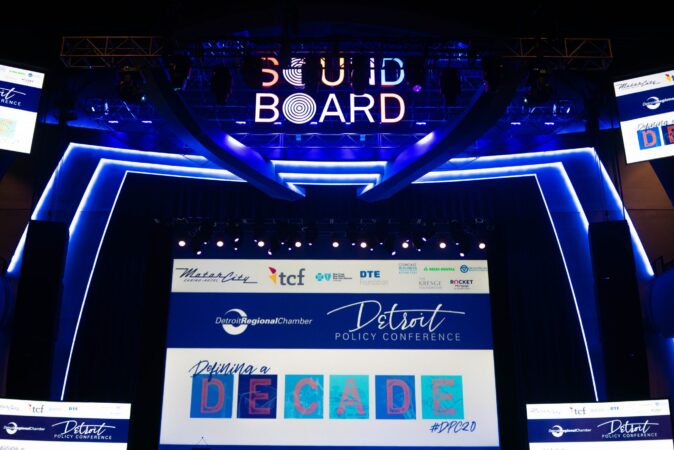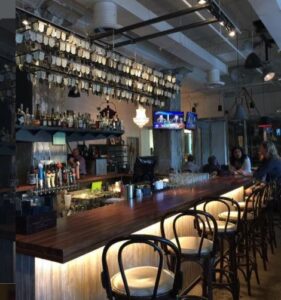Detroit Policy Conference, AKA DPC20, was chock full of important information. It was an engaging day with exciting insights for what’s to come in 2020 and beyond.
With speakers all across the board in terms of topics, including Lt. Governor Garlin Gilchrist, Mayor Mike Duggan, Ford Motor Company‘s Mary Culler, and Bedrock‘s Matt Cullen, we were able to see first-hand the plans that are projected as “on the way” within the next decade.
We’ve split our DPC20 info roundup into the four founding topical pillars at Detroitisit: Culture, Community, Innovation, and Design in order to better assist your navigation. You could be an absolute superstar and read all four of the pillars because we know you care about Detroit as much as we do!
CULTURE
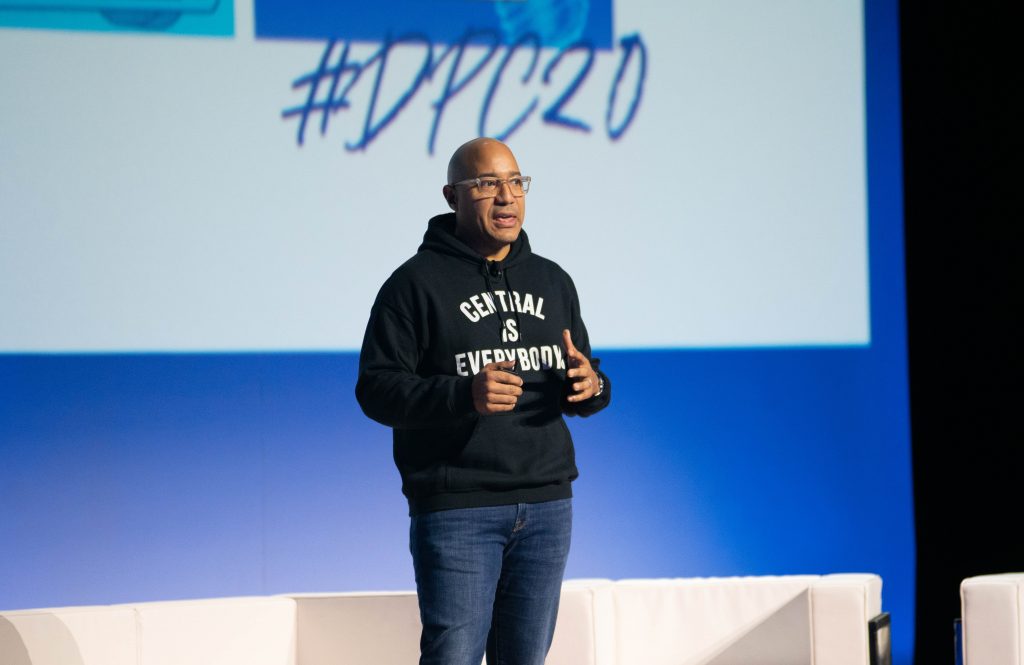
DENNIS ARCHER JR. AT DETROIT POLICY CONFERENCE 2020. PHOTO AMY NICOLE / ACRONYM
At the center of DPC20 was the sentiment that Detroit is NOT a comeback city. After years of negativity, as well as the radical choice to continue to pose Detroit as an “underdog,” the city and some of its leaders are looking to end the narratives that we’re in “comeback” mode. To further this thought, the former mayor’s son, Dennis Archer Jr. took the stage as the Chairman of the conference, he and shared the sentiment that we need to respectfully leave behind the sentiment of “Detroit vs. Everybody” which he wove into his speech:
“Detroit IS everybody now. Detroit vs everybody is still relevant in a lot of ways, but Detroit IS everybody.” – @DennisArcherJr #dpc20
— Detroitisit (@Detroitisit) January 29, 2020
Detroit Mayor Mike Duggan took the stage to share his thoughts and review the past few years under his leadership, along with the history surrounding the city. The passion that Duggan expressed leaned heavily into the fact that, yes, there have been rough patches throughout the years, but the reason Detroit is thriving again isn’t because of an influential savior swooping in and pumping money into the city – something that many people believe when describing Detroit’s continued rise. He shared his belief that it is due to the will and desire of the citizens of Detroit that never gave up.
“The people who stayed? They never lost that grit, that determination, that belief that they love their city. They didn’t always like what was about it in their neighborhood but the people who stayed stayed because they believed.” @MayorMikeDuggan #DPC20 (? @acronymofficial) pic.twitter.com/JojWxUvieg
— Detroitisit (@Detroitisit) January 29, 2020
Duggan’s sentiments were echoed in the following panel, which included David Alade, Founding Partner of Century Partners, Clifford Brown, Director of Development at Woodborn Partners, Kumar Kintala, Midtown Detroit Director, and Midtown Detroit Inc.’s Susan T. Mosey. Out of their panel, one of the most resonating quotes was talking about the difference between “Downtown Detroit” and the Neighborhoods of Detroit, verifying that have both very different infrastructures.
Woodborn Partners’ Clifford Brown, had this to say:
“We often talk about the two Detroits: right Downtown versus the Neighborhoods. And I think that is certainly valid, and we have to be sensitive to that narrative. But I think we also have to look at it as two Detroit’s in terms of the infrastructure and the built environment – and those two things are not mutually exclusive. They each have unique needs. And we have to find a way to meet each of those needs while being sensitive to each other. We need to bring in more tax dollars, we need more of a base to support the work that we’re doing. But at the same time, we need to respect the culture and the people of the city who have been here and I think there’s a way to do that, that needs everybody’s needs and keeps everybody happy.”
COMMUNITY
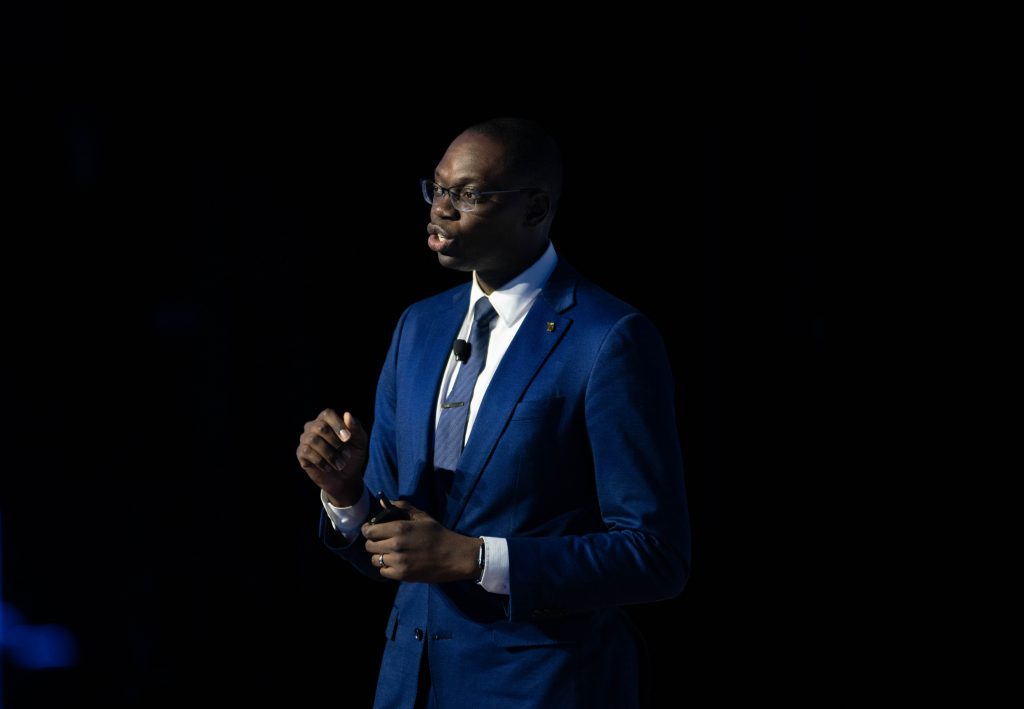
LT. GOV. GARLIN GILCHRIST AT DPC20. PHOTO AMY NICOLE / ACRONYM
Lt. Governor Garlin Gilchrist is a fresh and vibrant superstar advocating for the community. Considering he’s a large part of it – living in Corktown with his growing family, he gave plenty of insights that intertwined between past and present, highlighting how mobility can be experienced, not only with vehicles but with the people living in the city.
“What if we make Michigan the place that moves ideas. What that means is any person, regardless of your station in life, we all have ideas. But we need to do the work to make sure that Michigan is the place where those ideas can be viable, where you can bring those ideas into the world and have them be successful.”
He didn’t stop there. In regards to education, and how it ties into the bigger picture of Detroit, he shared how the city is looking to expand its educational footprint. “First, we are investing in education for children and adults. Regardless of your zip code, we need to create the conditions for people to be successful. That means investing in people,” said Gilchrist.
He wasn’t the only one focused on education. Almost every panel at the Detroit Policy Conference 2020 discussed how important education was for the interworkings and health of the city, both with individuals and with the economy. Woodborn Partners’ Clifford Brown had one of the most memorable sentiments of the day, by saying the following:
(Cont) “…If ultimately we’re not creating amazing schools for children to grow up in, we’re not really creating an opportunity for something that is #sustainable.“ Cliff Brown, @woodbornpartner #DPC20 #detroit
— Detroitisit (@Detroitisit) January 29, 2020
INNOVATION
Gilchrist was at it again when it came to innovation sharing one of the most poignant thoughts when it came to Innovation as a whole:
“So let’s talk about things admission has been known for the last hundred years. I’d argue it’s really three things: Innovation, Grit, and Entrepreneurship. Three concepts that everyone in this room I believe, is pretty familiar with, and really has exhibited in one form or another. I hate when people use words that don’t have a definition. We’re gonna talk about what I mean. You see innovation, you hear that word all the time is a buzzword that has been so overused that meetings, everyone says that they are innovating, but no one agrees is what that means. I think we should define innovation, quite simply.
Something that’s new, different, better, more valuable to more people. And notice that the definition doesn’t have a particular mindset. Because you can innovate things beyond technology. You can innovate in partnership and relationship with something that is core to how the Detroit Regional Chamber and Detroit policy happens. You can innovate in terms of creating space that isn’t necessarily technology.
Now, the grit – you hear a lot about how important grit is to success. In the last 10 years or so, I’ve been talking about a lot in the context of how we can foster grit amongst young people because it is going to be a determining factor in your success. I see it simply as the ability to focus on a goal and make sure that the setbacks that come in front of you when you’re trying to reach that goal, if you can overcome it, you’ll stick with it. This is something that entrepreneurs I know I can do every single day.” – Lt. Governor Garlin Gilchrist
When it comes to grit, one of the things we’re constantly striving towards and building as a state happens to be public transit in regards to mobility. David Coulter discussed the major moves happening within transit as a whole and some statistics that connect with that.
According to Coulter, “40% of the workers in Oakland County don’t live in Oakland County and they need mobility options to get there… almost a third of all the jobs in Oakland County are not served by one of the current transit options. That’s 300,000 people. And by the way, Oakland County workers travel outside of Oakland County as well. Almost 20% of them go to Wayne County.” He went on to say to the audiences’ glee, “You know, these borders are artificial, and we need to start treating them as such.”
Coulter noted that greater Detroit is often compared to places like Seattle, Atlanta, Indianapolis, and Denver – before reminding the audience that these locations all have made significant investments in transit. In recently looking over the 2016 transit plan, the County saw options they had to improve what was already a plan with solid foundations. It seems these are rigorously working towards a solution.
“I believe, I’m optimistic, if we can get this legislation done in the next couple of weeks in Lansing, and again, working with our regional partners, I believe we can have a transit solution that will benefit everyone in this region THIS YEAR!” #DPC20 – @davidwcoulter
— Detroitisit (@Detroitisit) January 29, 2020
It seems there is hope as Coulter shared that there will be an answer to the transit issues we face. (And a secret hope for some that Coulter can lead by example to get Macomb County on board with better future transit systems.)
DESIGN
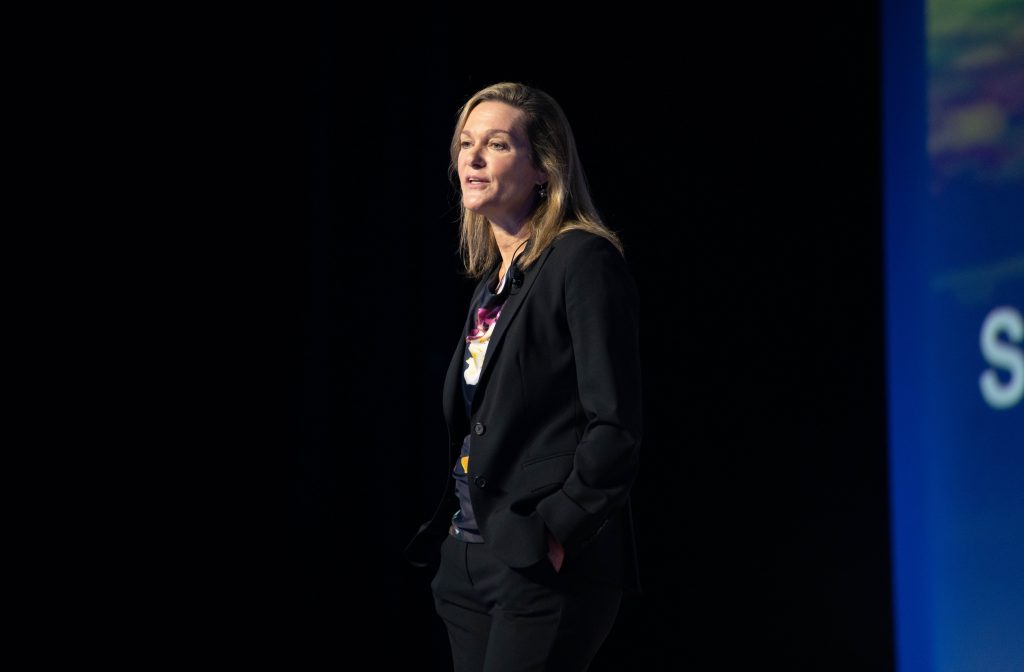
MARY CULLER OF FORD MOTOR COMPANY AT DPC20. PHOTO AMY NICOLE / ACRONYM
One of the biggest design highlights for the Detroit Policy Conference 2020 comes from Ford Motor Company and Mary Culler, who shared a deep dive on what some of the plans for the company’s purchase of the Michigan Central Station are, and what the plans are to help expand the area, not only as a “developer,” but as a neighbor.
“This mobility and innovation district with the station and a center will serve as an accelerator to make sure Detroit leads the next mobility revolution. This means creating an ecosystem to explore real problems, like how will cities need to change for the arrival of autonomous connected vehicles? How might AV’s reduce parking spaces demand? We all know parking is a real challenge in a big city. How might pedestrians, bike riders and vehicles all share the streets safely? How will we deliver packages in the future? And most importantly, how can we ensure mobility lead to new and better economic and social opportunities, not just for those who own cars, but for everyone. Access is critical.” – Mary Culler
Using 3D modeling, much of the scaffolding and iconic Michigan Central Station structure is being restored and rebuilt, and plans are on the way for other parts of the building. The main tower will include office spaces with the very top of MCS is being reimagined as a hospitality space. Additionally, the historic Albert Kahn designed building, which was formerly the Book Depository is described by Cullar as what will be “a mix of maker space and provide office spaces for technology providers and [is] expect[ed] to open in 2021. So it will be the first building open.”
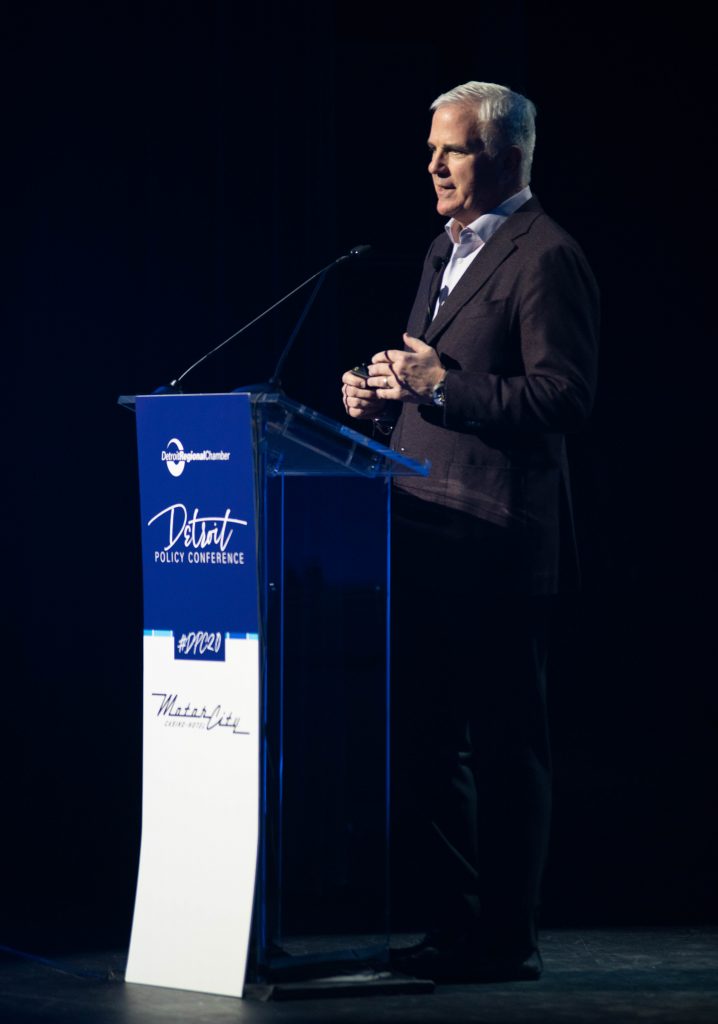
MATT CULLEN, CEO OF BEDROCK AT DPC20. PHOTO AMY NICOLE / ACRONYM
And as for the rest of the city’s design components? Matt Cullen, CEO of Bedrock, brought forth an exciting vision for the city, which included an immersive video rendering of what is envisioned for Detroit in the next 10 years.
He spoke to the former Hudson’s site being rebuilt (and shares that the build will be coming out of the hole in the ground soon), along with expansions in multiple other areas like in the Brush Park neighborhood. Cullen also shared the stat that from 2013 to now, around $8.1 billion in development has made it into Detroit.
And of course, the question that everyone seems to ask when Matt Cullen is on the mic – What does Dan Gilbert, the man who seems to be awarded for all of the moves that have taken place in Detroit for the most part, think about all of this?
Cullen shares the following:
“… He made a commitment when he came down here. I mean, one of his quotes was he spent the first 50 years of his life building Quicken Loans, he was going to spend the next 50 years of his life building up the city of Detroit, and that’s how committed he’s been to, it and how committed he remains.
And so I’m always very careful to make sure that everybody understands that it takes a village and none of this could have about a whole lot of people. I think it’s equally true that you know, Dan was a catalyst and a spark to this and took it to at a pace… And I think that’s just a fear accounting of where we are. So I think Dan would be proud. I know Dan is proud of the accomplishments, I think he would even push off the ‘Decade of Dan’ discussion.
And, he’s obviously paying a lot of attention. And he’s going on and probably watching our live stream as well. But he’s, he’s getting out to the office a lot more. He’s still making all the big decisions still… the passion and the vision behind it, have a safe place for us in the city of Detroit. And I think, you know, the next decade will reflect this continue to follow that at the same level, and I think we’re going to all be better for that.”


